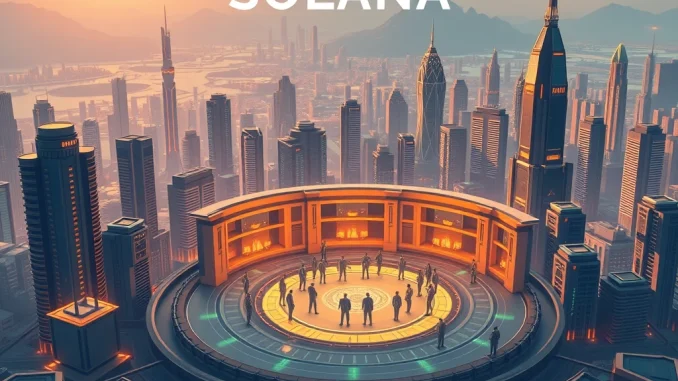
Is Solana’s inflation rate giving you the chills? You’re not alone. The recent surge in Solana’s annualized inflation to a whopping 30.5% has sparked intense debate within the community. But fear not, crypto enthusiasts! Galaxy Research has stepped into the arena with a groundbreaking proposal that could redefine how Solana tackles its inflation woes. Enter the MESA mechanism – a tiered voting system designed to bring consensus and efficiency to Solana’s governance. Let’s dive deep into this innovative approach and explore how it aims to steer Solana towards its long-term inflation target of 1.5%.
Understanding Solana Inflation and the Current Dilemma
Before we delve into the intricacies of the MESA mechanism, let’s understand the elephant in the room: Solana inflation. Like many blockchain networks, Solana utilizes inflation to incentivize validators to secure the network and participate in consensus. However, the rate of inflation is a delicate balancing act. Too much inflation can devalue the SOL token, while too little might disincentivize validators.
Recently, the approval of SIMD-96 threw a curveball into this equation. This update, designed to redirect all priority fees to validators, inadvertently led to a significant jump in Solana’s annualized inflation rate, reaching a concerning 30.5%. This spike ignited urgent discussions about the need for adjustments to Solana’s inflation parameters.
The core challenge lies in achieving consensus on these adjustments. Currently, Solana’s governance relies on binary voting, where validators simply vote ‘yes’ or ‘no’ on proposals. While straightforward, this system can be less nuanced and potentially slower in reaching optimal solutions, especially when dealing with complex issues like inflation rates.
Introducing the MESA Mechanism: A Revolutionary Approach to Solana Governance
Galaxy Research’s proposed MESA (Mechanism for Expedited Solana Adjustments) mechanism offers a fresh perspective on Solana governance. Instead of a simple binary vote, MESA introduces tiered voting, allowing validators to express their preferences across a spectrum of deflation rate options. This is a significant departure from the current system and aims to foster a more collaborative and efficient decision-making process.
Here’s a breakdown of the key features of the MESA mechanism:
- Tiered Voting System: Validators are no longer limited to a simple ‘yes’ or ‘no’. They can vote for a specific deflation rate from a range of pre-defined options.
- Stake-Weighted Average: The final outcome isn’t determined by a simple majority. Instead, it’s calculated as a stake-weighted average of all votes. This ensures that validators with a larger stake in the network have a proportionally greater influence on the outcome.
- Expedited Adjustments: The MESA mechanism is designed to streamline the process of adjusting inflation rates, enabling Solana to adapt more quickly to changing network conditions and economic realities.
- Focus on Long-Term Target: The initiative is explicitly geared towards accelerating Solana’s progress towards its long-term inflation target of 1.5%.

How Does Tiered Voting with MESA Enhance Solana’s Inflation Management?
The beauty of the MESA mechanism lies in its ability to capture a more granular view of validator sentiment. Let’s explore the benefits of this tiered voting approach for managing SOL inflation:
- Nuanced Consensus: Binary voting can often lead to polarized outcomes, potentially overlooking compromise solutions. MESA, by allowing validators to choose from a range of options, facilitates a more nuanced expression of preferences and increases the likelihood of finding a consensus that reflects the collective will of the network.
- Reduced Gridlock: In situations where the community is divided, binary voting can lead to gridlock, hindering necessary adjustments. MESA’s stake-weighted average approach can help break through such impasses by identifying a middle ground that garners broad support, even if not unanimous agreement.
- Faster Decision-Making: By streamlining the voting process and fostering consensus, MESA aims to accelerate the pace of decision-making regarding inflation adjustments. This agility is crucial for Solana to remain responsive to market dynamics and maintain its economic stability.
- Optimized Inflation Control: The ability to fine-tune inflation rates through tiered voting empowers Solana to more effectively manage its tokenomics. This can lead to a more stable and predictable inflationary environment, benefiting both validators and SOL holders in the long run.
Addressing the Inflation Surge Post-SIMD-96: A Timely Intervention
The timing of Galaxy Research’s proposal is particularly significant given the recent inflation spike triggered by SIMD-96. This update, while intended to reward validators with priority fees, inadvertently pushed the annualized Solana inflation rate to unsustainable levels. The MESA mechanism offers a timely and targeted solution to address this unintended consequence.
By providing a more efficient and nuanced way to adjust inflation parameters, MESA can help Solana recalibrate its tokenomics and bring inflation back under control. This is crucial for maintaining the long-term health and attractiveness of the Solana network. It demonstrates a proactive approach to governance, showing that Solana is capable of adapting and evolving to address emerging challenges.
Validator Voting Power: Empowering Stakeholders in Solana’s Future
The MESA mechanism underscores the critical role of validator voting in shaping Solana’s future. Validators are not just network operators; they are active participants in governance, entrusted with the responsibility of making key decisions that impact the entire ecosystem. MESA enhances this role by providing validators with a more sophisticated and impactful voting tool.
By moving beyond binary choices and embracing tiered voting, Solana is empowering its validators to contribute more meaningfully to the network’s evolution. This increased engagement and responsibility can foster a stronger sense of ownership and commitment among validators, further strengthening the security and decentralization of the Solana blockchain.
Potential Considerations and the Path Forward
While the MESA mechanism holds immense promise, it’s important to acknowledge potential considerations as it moves forward:
- Validator Education and Adoption: Effective implementation of MESA will require validators to understand the new voting process and actively participate in tiered voting. Clear communication and educational resources will be essential to ensure smooth adoption.
- Parameter Selection: The range of deflation rate options offered in the tiered voting will need careful consideration. Setting appropriate parameters is crucial to ensure that the MESA mechanism effectively guides Solana towards its desired inflation target.
- Security and Robustness: As with any governance mechanism, the security and robustness of MESA are paramount. Thorough testing and audits will be necessary to ensure that the system is resistant to manipulation and functions as intended.
- Community Feedback: While proposed by Galaxy Research, the ultimate decision on adopting MESA rests with the Solana community. Open discussions, feedback loops, and community consensus-building will be vital for successful implementation.
Conclusion: A Crucial Step Towards Sustainable Solana Tokenomics
Galaxy Research’s MESA mechanism represents a potentially transformative step forward for Solana governance. By introducing tiered voting and a stake-weighted average outcome, it offers a more nuanced, efficient, and adaptable approach to managing Solana inflation. As Solana navigates the complexities of its tokenomics, the MESA proposal provides a valuable tool for achieving sustainable inflation control and realizing its long-term vision.
The coming weeks and months will be crucial as the Solana community deliberates on the MESA mechanism. Its adoption could mark a significant milestone in the evolution of Solana’s governance, paving the way for a more robust, responsive, and ultimately, more successful blockchain network. Keep your eyes peeled for updates as this exciting development unfolds in the Solana ecosystem!



